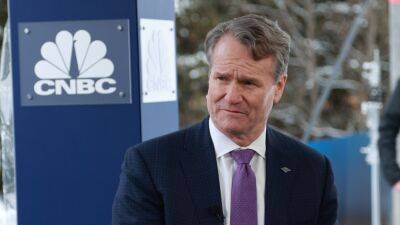Deutsche Bank is no Credit Suisse, despite investors’ fears
I t’s rarely a good sign when politicians, in the middle of a crash in the share price of their country’s biggest financial institution, declare there’s nothing to worry about. Such remarks often just feed a sense of panic. The German chancellor, Olaf Scholz, would have been better advised to say nothing about Deutsche Bank.
But it is also true that Scholz was exaggerating only slightly when he said that “Deutsche Bank has fundamentally modernised and reorganised its business model and is a very profitable bank.” The modernisation has some way to go, but, on the pure numbers, Deutsche is not the crisis-ridden, scandal-engulfed creature that it was in 2016-18.
The bank has had several rinses through chief executive Christian Sewing’s cost-cutting wringer and last month reported an annual profit of €5.7bn (£5bn), its highest for 15 years. By contrast, Credit Suisse lost 7.3bn Swiss francs (£6.6bn) in 2022 and was only six months into an unconvincing three-year turnaround plan.
One can point to other differences. There is no evidence of a flight of depositors at Deutsche, the factor that really sealed Credit Suisse’s fate. Nor, as far as we know, is the European Central Bank in a flap about Deutsche in the way that Swiss authorities were when they advanced a 50bn Swiss franc borrowing facility to Credit Suisse in the days before last weekend’s forced sale to UBS. At Deutsche, the only minor news from Frankfurt was a decision to buy back a small slice of its debt, which regulators would not have permitted if they were worried about liquidity.
Why then, for a second Friday in a row, were investors staring in horror at the plunging share price of a big European bank? At its worst point, Deutsche was down 14%. For the time being,
Read more on theguardian.com












